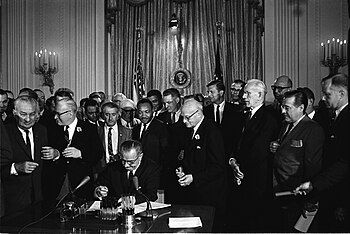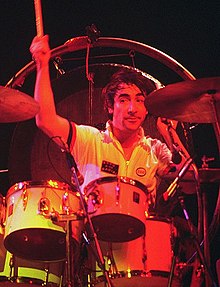The 1960s Portal
The 1960s became synonymous with the new, radical, and subversive events and trends of the period. In Africa the 1960s was a period of radical political change as 32 countries gained independence from their European colonial rulers. Some commentators have seen in this era a classical Jungian nightmare cycle, where a rigid culture, unable to contain the demands for greater individual freedom, broke free of the social constraints of the previous age through extreme deviation from the norm. Christopher Booker charts the rise, success, fall/nightmare and explosion in the London scene of the 1960s. However, this alone does not explain the mass nature of the phenomenon. Several nations such as the U.S., France, Germany and Britain turned to the left in the early and mid 1960s. In the United States, John F. Kennedy, a Keynesian and staunch anti-communist, pushed for social reforms. His assassination in 1963 was a stunning shock. Liberal reforms were finally passed under Lyndon B. Johnson including civil rights for African Americans and healthcare for the elderly and the poor. Despite his large-scale Great Society programs, Johnson was increasingly reviled by the New Left at home and abroad. The heavy-handed American role in the Vietnam War outraged student protestors across the globe, as they found peasant rebellion typified by Ho Chi Minh and Che Guevara more appealing. Italy formed its first left-of-center government in March 1962 with a coalition of Christian Democrats, Social Democrats, and moderate Republicans. Socialists joined the ruling block in December 1963. In Britain, the Labour Party gained power in 1964. In Brazil, João Goulart became president after Jânio Quadros resigned. This is a Featured article, which represents some of the best content on English Wikipedia..
The September 1964 South Vietnamese coup attempt took place before dawn on September 13, 1964, when the ruling military junta of South Vietnam, led by General Nguyễn Khánh, was threatened by a coup attempt headed by Generals Lâm Văn Phát and Dương Văn Đức, who sent dissident units into the capital Saigon. They captured various key points and announced over national radio the overthrow of the incumbent regime. With the help of the Americans, Khánh was able to rally support and the coup collapsed the next morning without any casualties. In the immediate month leading up the coup, Khánh's leadership had become increasingly troubled. He had tried to augment his powers by declaring a state of emergency, but this only provoked large-scale protests and riots calling for an end to military rule, with Buddhist activists at the forefront. Fearful of losing power, Khánh began making concessions to the protesters and promised democracy in the near future. He also removed several military officials closely linked to the discriminatory Catholic rule of the slain former President Ngô Đình Diệm; this response to Buddhist pressure dismayed several Catholic officers, who made a few abortive moves to remove him from power. (Full article...)This is a Good article, an article that meets a core set of high editorial standards.
On February 28, 1966, a NASA Northrop T-38 Talon crashed at Lambert Field in St. Louis, Missouri, killing two Project Gemini astronauts, Elliot See and Charles Bassett. The aircraft, piloted by See, crashed into the McDonnell Aircraft building where their Gemini 9 spacecraft was being assembled. The weather was poor with rain, snow, fog, and low clouds. A NASA panel, headed by the Chief of the Astronaut Office, Alan Shepard, investigated the crash. While the panel considered possible medical issues or aircraft maintenance problems, in addition to the weather and air traffic control factors, the end verdict was that the crash was caused by pilot error. In the aftermath of the crash, the backup crew of Thomas Stafford and Eugene Cernan were moved up to the primary position for the Gemini 9 mission, scheduled for early June. Jim Lovell and Buzz Aldrin, who had formerly been the backup crew for Gemini 10, became the mission's backup crew and through the normal rotation were assigned as prime crew for Gemini 12. Without the Gemini experience, it is unlikely that Aldrin would have been assigned to the Apollo 11 mission, during which he became the second person to walk on the Moon. (Full article...)Selected picture - United States President Lyndon B. Johnson (seated) signs the Civil Rights Act of 1964, a landmark piece of legislation that outlawed racial segregation in schools, public places, and employment. Among the guests behind him is Martin Luther King Jr. (directly behind and to the right of Johnson).
Did you know -
Related portalsThis is a Featured article, which represents some of the best content on English Wikipedia..
"Hey Jude" is a song by the English rock band the Beatles that was released as a non-album single in August 1968. It was written by Paul McCartney and credited to the Lennon–McCartney partnership. The single was the Beatles' first release on their Apple record label and one of the "First Four" singles by Apple's roster of artists, marking the label's public launch. "Hey Jude" was a number-one hit in many countries around the world and became the year's top-selling single in the UK, the US, Australia and Canada. Its nine-week run at number one on the Billboard Hot 100 tied the all-time record in 1968 for the longest run at the top of the US charts, a record it held for nine years. It has sold approximately eight million copies and is frequently included on music critics' lists of the greatest songs of all time. The writing and recording of "Hey Jude" coincided with a period of upheaval in the Beatles. The ballad evolved from "Hey Jules", a song McCartney wrote to comfort John Lennon's young son Julian, after Lennon had left his wife for the Japanese artist Yoko Ono. The lyrics espouse a positive outlook on a sad situation, while also encouraging "Jude" to pursue his opportunities to find love. After the fourth verse, the song shifts to a coda featuring a "Na-na-na na" refrain that lasts for over four minutes. (Full article...)This is a Good article, an article that meets a core set of high editorial standards.
Keith John Moon (23 August 1946 – 7 September 1978) was an English musician who was the drummer for the rock band the Who. Regarded as one of the greatest drummers in the history of rock music, he was noted for his unique style of playing and his eccentric, often self-destructive behaviour. Moon grew up in Wembley and took up the drums during the early 1960s. After playing with a local band, the Beachcombers, he joined the Who in 1964 before they recorded their first single. Moon was recognised for his drumming style, which emphasised tom-toms, cymbal crashes, and drum fills. Throughout his tenure with the Who, his drum kit steadily grew in size, and (along with Ginger Baker) he has been credited as one of the earliest rock drummers to regularly employ double bass drums in his setup. Moon occasionally collaborated with other musicians and later appeared in films, but considered playing in the Who his primary occupation, and remained a member of the band until his death. In addition to his talent as a drummer, Moon developed a reputation for smashing his kit on stage and destroying hotel rooms on tour. He was fascinated with blowing up toilets with cherry bombs or dynamite, and destroying television sets. Moon also enjoyed touring and socialising, and became bored and restless when the Who were inactive. His 21st birthday party in Flint, Michigan, has been cited as a notorious example of decadent behaviour by rock groups. (Full article...)Selected article -The 1964 Winter Olympics, officially known as the IX Olympic Winter Games (German: IX. Olympische Winterspiele) and commonly known as Innsbruck 1964 (Austro-Bavarian: Innschbruck 1964), was a winter multi-sport event which was celebrated in Innsbruck, Austria, from January 29 to February 9, 1964. The city was already an Olympic candidate, unsuccessfully bidding to host the 1960 Games. Innsbruck won the 1964 Games bid, defeating the cities of Calgary in Canada and Lahti in Finland. The sports venues, many of which were built for the Games, were located within a radius of 20 km (12 mi) around Innsbruck. The Games included 1,091 athletes from 36 nations, which was a record for the Winter Games at the time. Athletes participated in six sports and ten disciplines which bring together a total of thirty-four official events, seven more than the 1960 Winter Olympic Games. The luge made its debut on the Olympic program. Three Asian nations made their Winter Games debut: North Korea, India and Mongolia. The Soviet Union broke the record for the most gold and overall medals at a single Winter Olympics, with eleven and twenty five respectively, and finished first in the medal table. The USSR was followed by Austria, the host country, which won twelve medals, four of which were gold. Soviet athletes Lidia Skoblikova won all four women's races of speed skating and Klavdiya Boyarskikh won all three events of cross-country skiing. The Swedish cross-country skier Sixten Jernberg, a three-time medalist at these Games, became the first athlete to collect nine medals at the Winter Games. In alpine skiing, the French sisters Christine and Marielle Goitschel each obtained a gold and a silver medal. Before the Games, the Austrian army was mobilized to deal with the lack of snow. They brought thousands of cubic meters of it from Brenner Pass, close to the Italian border. The Olympic Winter Games was held for a second time at Innsbruck in 1976. (Full article...)More Did you know (auto generated)
TopicsCategoriesWikiProjects
Associated WikimediaThe following Wikimedia Foundation sister projects provide more on this subject:
Discover Wikipedia using portals |
How Can We Help?






























Recent Comments